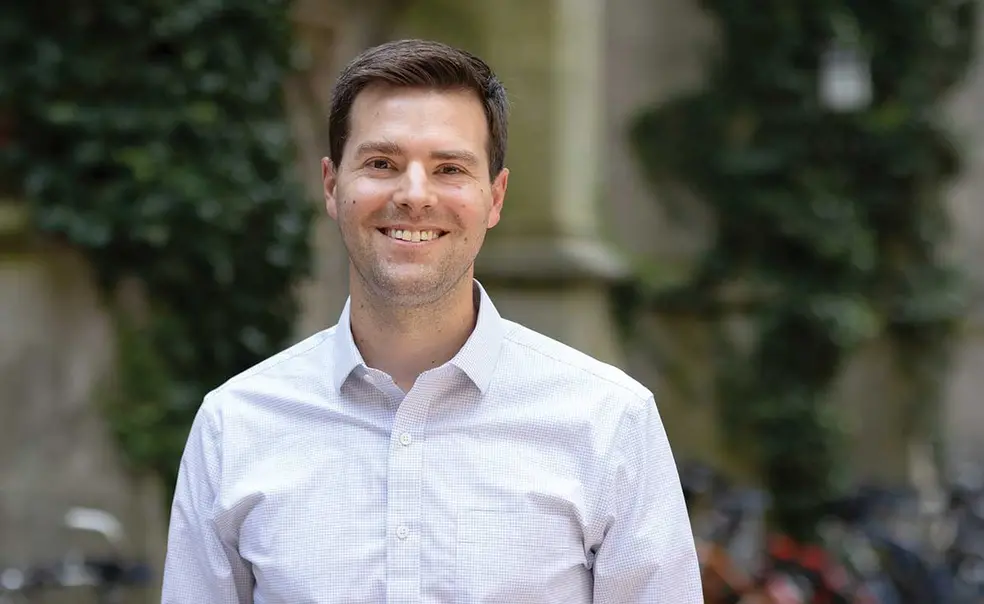Class Close-Up: Probing Ethics and the Environment Through Religion
Does morality come from God or can it be reached independently? Students in the class “Environmental Ethics and Modern Religious Thought” pondered the question quietly on a rainy Tuesday afternoon early in the fall semester. After a few minutes, instructor Ryan Darr, a postdoctoral research associate at the University Center for Human Values and lecturer in the religion department, opened the discussion. This led to a lively debate on how people determine the value of nonhuman elements — including animals and nature — and how that determination impacts the ways we interact with them.
The inspiration for this new class came from questions Darr has had surrounding religious discourses about environmental and animal ethics. “I’ve just become personally very preoccupied with environmental questions, issues of animals and animal ethics,” Darr said, “and as a specialist in religious ethics, I wanted to spend more time thinking about how those intersected with religious traditions.”
During the weekly three-hour lecture in Marx Hall, the class of 11 students explores these ideas through a variety of primarily Christian (but also Jewish) theological concepts, including creation, sin, law, incarnation, and salvation. Students apply these doctrines to question the religious ethics of a variety of pressing issues, including climate change, environmental racism, animal welfare, and food production. Books for the course include Journey of the Universe by Mary Evelyn Tucker and Brian Swimme; Laudato Si’: On Care for Our Common Home by Pope Francis; and Ethics and the Environment by Dale Jamieson. In addition to class discussions, students completed reading responses, a book analysis, a presentation, and a final paper.
“The class takes the environmental crisis as an opportunity to return to religious resources and think about their potential complicity,” Darr said. Students have wrestled with the different arguments and critiques offered, he added, while also developing their own interpretations of the texts.
The goal of the class is to have students step back and think critically about what has shaped their perspectives and understanding of ethical issues, as well as those of the broader society. “I want them to see religion as a resource, but also an object of critique and development over time,” Darr said.
Ricky Feig ’22, a mechanical and aerospace engineering major, signed up for the class because the description caught his attention. He grew up with Catholic influences but has explored his Jewish heritage more since becoming a Princeton student, he said. “I want to get into renewable energy and sustainability,” Feig said. “So, sort of looking at that from a very different perspective was something that I found really interesting.”












3 Responses
Kerry H. Brown ’74
4 Years AgoEnvironmentalism as a Secular Religion
Instructor Ryan Darr’s class must have been fascinating. The intersection of religion and the environment is fertile ground for spirited discussion. Neither the article nor the required reading sheds light on whether the course investigated the claim that Zealous Environmentalism (capitalization intended) has become a secular religion with attendant psychological involvement.
“Environmentalism today is the dominant secular religion of the educated, upper-middle-class elite in most developed...nations. It provides a new story about our collective and individual purpose.” So says environmentalist and best-selling author Michael Shellenberger in his myth shattering Apocalypse Never (Harper Collins, 2020).
Do some anointed scientists and politicians act as intermediaries with Goddess Earth? Are those who lack faith shunned, or roasted in the virtual public square, sometimes with threats, lost jobs and advancement? This new, but old, religion could be an interdisciplinary course jointly taught by three departments — religion, politics, and psychology. A full inquiry can be made into man’s search for meaning, emotional states, and drives for power. May I audit said course if offered?
Norman Ravitch *62
4 Years AgoReligion, Who Needs It?
Religion is based on fear. It rarely has been on the good side of human needs and aspirations.
Rocky Semmes ’79
4 Years AgoOn Love and Religion
Appreciable applause and all appropriate accolades to instructor Ryan Darr for asking “does morality come from God or can it be reached independently?” (On the Campus, December issue). I am formerly a devout regular Mass-attending cradle-Catholic, one of the pray-pay-and obey faithful. But with a recent change-of-heart (and until further clarification), I no longer buy in to the bromide of the Bearded Old Bud in the Bathrobe (the God in the Sky Guy).
I maintain that the abstract principle of Love is a superb stand-alone substitute sufficiently suited to supplant all the cataloged moralities of the religions. There are no cassocks, catechisms, or cathedrals required to subscribe to the principle and practice of Love. It perhaps might prove itself a universal solution to most every and any problem.
The current COVID crisis is a case in point. The key to neutralizing its health threat are the various vaccines. The vaccines were developed through taking the time to know COVID, to familiarize ourselves with all of its character and attributes, to understand it; which, in short, is to love it.
We now know COVID but to do that we had to get close to it, intimate with it. But that intimacy rewarded us with a vaccine. Love is powerful medicine. Until I am convinced otherwise my moral compass is love, there is no religion required.